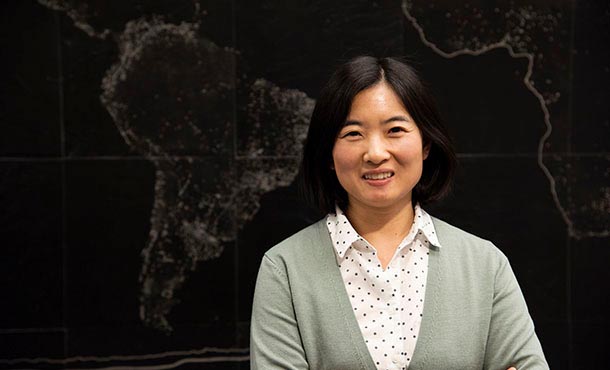
Jing Yang, assistant professor of electrical engineering at Penn State. IMAGE: PENN STATE COLLEGE OF ENGINEERING
Pushing the boundary forward: Researcher's achievements honored with two awards
1/26/2021
By Sarah Small
UNIVERSITY PARK, Pa. — As a high school student in China, Jing Yang, now assistant professor of electrical engineering at Penn State, said she faced pressure from her community and her family to not go into a science, technology, engineering or mathematics (STEM) field.
“There were stereotypes that girls could not be good scientists or engineers,” Yang said. “I was not convinced.”
When the time came to choose between liberal arts or STEM entrance exams for college, Yang chose the STEM exams, against the advice of those around her. She was accepted into her top choice: the electrical engineering program at the University of Science and Technology of China. After finishing her undergraduate studies, she came to the United States to pursue her master’s and doctorate degrees at the University of Maryland.
Now, Yang is pioneering research in energy harvesting communications, the age of information and machine learning for wireless networking systems, and her work is being recognized.
Most recently, she was honored with two awards for women in her field — the 2020 Networking Networking Women (N2Women): Stars in Computer Networking and Communications award, and the Women in Communications Engineering (WICE) Early Achievement Award.
“I appreciate the recognition from the community for what I have done in the past,” Yang said. “In the future, I will keep pursuing what I think is interesting in this area and hopefully push the boundary forward.”
Each year, 10 women are named to the Stars in Computer Networking and Communications list, which is created by N2Women, a “community of researchers in the fields of networking and communications” that “encourages diversity and aims at fostering connections among women in the computing sub-field,” according to their website. The selection criteria included scientific profile and contributions, experience, diversity aspects and recommendations, according to the award letter.
WICE, a committee within the Institute of Electrical and Electronics Engineers (IEEE) Communications Society, grants the Early Achievement Award to members of WICE who “have done outstanding technical work in the broad field of communications engineering and have achieved early career visibility in the field through research and service,” according to its website.
Yang’s specific research interests include wireless communications and networking, information theory, statistical signal processing and machine learning. She seeks to open new frontiers in understanding the fundamental limits of wireless networking systems, as well as designing efficient scheduling, resource allocation and learning algorithms for system performance optimization. She was recognized previously with the National Science Foundation CAREER award in 2015. Yang also has served as a co-chair for five workshops and symposiums, a technical program committee member of several conferences, and an editor for IEEE Transactions on Wireless Communications and IEEE Transactions on Green Communications and Networking.
Yang’s advice for other women considering STEM fields is to not be deterred by anyone else’s opinion.
“We have the freedom to pick the area that is of interest to us,” she said. “If a woman has an interest in STEM fields, it should not be discouraged by any other external factors. She should follow what interests her most from the bottom of her heart.”



